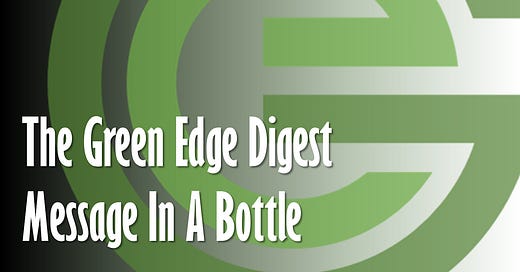The Green Edge Message In A Bottle – January 2025
Charting the course to a sustainable, inclusive, and resilient future.
Our latest batch of sustainability-focused publications spans a wide range of topics. Some zoom in on the labor market—examining the skills needed to meet net-zero goals and ensure a just transition. Others take a broader view, tackling systemic risks to planetary health or advocating for nature-based solutions as engines of economic growth. Across the collection, a few common themes emerge:
The Green Economy Transition: Reports like Net Zero Careers Accelerator and Future of Jobs Report 2025 emphasize the monumental task of reskilling workforces to support decarbonization. These efforts must be aligned with inclusive policies to ensure equitable access to opportunities.
Systemic Change and Risk Management: Planetary Solvency and Climate Vulnerabilities highlight the interdependence of ecosystems, economies, and communities, advocating for systemic, risk-informed approaches to governance.
Innovation and Collaboration: Whether focusing on circular value chains, clean energy technologies, or urban sustainability, many reports underscore the need for cross-sector partnerships to unlock scalable solutions.
Social Justice and Equity: From nature-based solutions (Decent Work in Nature-Based Solutions) to addressing wage disparities (Cities Outlook 2025), the human dimension of the green transition—who benefits and who is left behind—takes center stage.
This collective wisdom reveals the intricate weave of challenges and opportunities in the green transition, offering a roadmap for policymakers, businesses, and communities alike.
While every report has something to say, eight Green Edge Top Reads stand out this month:
Green Jobs, Skills, and Enterprises (VSO, December 2023)
This Voluntary Service Overseas (VSO) report explores pathways to create green jobs for youth, women, and marginalized groups. It emphasizes the role of vocational training and circular economy principles in fostering inclusive, sustainable livelihoods.
Net Zero Careers Accelerator White Paper (GoodPeople, 2024)
Produced by GoodPeople, this report tackles the UK’s green skills gap, highlighting the need for radical collaboration between businesses, education providers, and communities. It champions job mapping tools and equitable hiring practices to build a robust green talent pipeline.
Accelerating Together: How the UK Workforce Can Get Net Zero Done (Bain & Company, January 2024)
This Bain & Company publication outlines the unprecedented reskilling effort required to prepare 4 million UK workers for the green transition. It calls for regional training hubs and public-private partnerships to address geographic and sectoral mismatches in green job availability.
Net Zero and the Labour Market: Evidence from the UK (LSE Public Policy Review, March 2024)
Anna Valero’s LSE analysis underscores the potential for green jobs to be “good jobs,” offering higher wages and skills intensity. However, it highlights challenges in ensuring equitable access to these opportunities and calls for targeted regional policies.
Future of Jobs Report 2025 (WEF, January 2025)
This World Economic Forum report explores how macrotrends like AI, demographic shifts, and the green transition will reshape the global labor market. Green and energy-transition roles are among the fastest-growing, with a significant emphasis on reskilling and inclusion.
Cities Outlook 2025 (Centre for Cities, January 2025)
The Centre for Cities identifies urban productivity as a driver of national prosperity, emphasizing the need for devolution and industrial strategies to address regional inequalities. Its call for place-based policies aligns with the broader aim of “levelling up” the UK economy.
Planetary Solvency: Finding Our Balance with Nature (IFoA / University of Exeter, January 2025)
This report by the Institute and Faculty of Actuaries and Exeter University introduces the RESILIENCE principles, a framework for managing systemic risks within planetary boundaries. It urges policymakers to prioritize ecological health as fundamental to human and economic security.
Decent Work in Nature-Based Solutions
Jointly produced by the ILO, UNEP, and IUCN, this report highlights the job creation potential of scaling nature-based solutions (NbS). It emphasizes the need for skill development and equity-focused policies to maximize NbS’ economic and social benefits.
This month, we’ve also added a book to our Top Reads list—How we sold our future. The failure to fight climate change (Polity Press, December 2024)—which seeks to address one major question: why do societies continue headlong on a path toward destruction of the natural environment, without which human civilisation could not exist? A big question, we feel.
As ever, our reading list is a vibrant collection, each one a message in a bottle tossed into the turbulent seas of the green transition. Together, they illuminate the contours of our shared challenges, offer solutions rooted in sustainability, and underscore the urgency of the climate moment. From strategies for reskilling millions of workers to systemic frameworks for planetary risk management, our collection tells a story of opportunity, innovation, and the resilience required to navigate the shifting tides of the global economy.
The Green Edge Digest features four posts going out on the first working day of each month. Our two easily-digestible posts—Message In A Bottle and Top Reads—are emailed to subscribers, while our two lengthier ones—The Take and The Digest Update—are accessible online at greenedge.substack.com. With these posts we hope each month to capture the essence of the raft of sustainability-related reports that have crossed our desk since our last monthly drop. We hope you find it useful.








